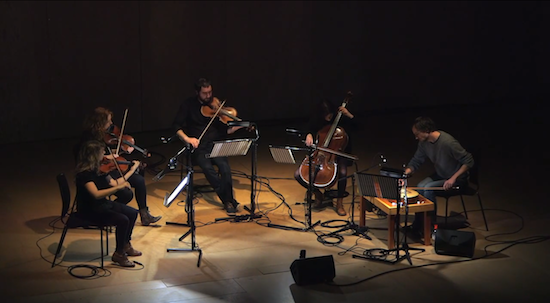The lovely, intimate and acoustically-exquisite St Luke’s on Old Street could almost have been built with Richard Skelton in mind. His music shares some of the venue’s sparseness, and it is given extra dramatic potency as it fills the room, rebounding gracefully off the ceiling and walls.
Tonight’s show features three pieces inspired by Skelton’s residency at Snape Maltings in Suffolk last December. Throughout his stay in Snape, he explored the surrounding landscapes, drawing particular inspiration from the river Alde and the expansive marshlands surrounding it, which eventually lead to the sea. It’s a familiar approach from Skelton, whose numerous wonderful albums have all been imbued with a sense of location and landscape, often very specific ones. And rivers have long featured prominently in that equation, although perhaps not as much as at St Luke’s.
Most fascinating, perhaps, is the "recruitment" of the Elysian Quartet for the three pieces, which, before the actual show, seemed to be an attempt to flesh out Skelton’s music by adding a cello, viola and two violins. In fact -and this is testament to Richard Skelton’s talent as a composer- the addition of the Elysian Quartet takes his music much further than merely adding some instruments, and indeed, all three pieces are evocative of Skelton’s previous body of work, whilst also branching out into new territory.
The first piece, ‘EA’, sounds instantly familiar for any fan of Skelton, with low, mournful drones from all instruments, the man himself using a bowed bouzouki. "Ea" is an old Anglo-saxon word for "river", and the slow-moving ebb and flow of the cello and bouzouki in particular sound like the effortless sea-wards drift of a body of water: patient, languid and eternal. As the piece progresses, one of the violinists starts a repeated series of short, almost pizzicato notes, as if we’re suddenly joined on this river journey by a fluttering bird. The bird theme returns on the second work, ‘Above/Below’, performed solely by the Elysian Quartet. The four players swirl and drift around one another, notes tumbling out in flurries or gracefully unfurled like opening flowers. Skelton’s intense relationship with nature is encapsulated on ‘Above/Below’, as he thoroughly researched the different species of bird he encountered whilst in Suffolk. The result is a piece that, whilst evidently performed on strings, manages to conjure up thoughts and images of birds in the mind’s eye. Even if he isn’t performing, Skelton’s alchemical touch is at the heart of this music.
Skelton returns for the final piece, ‘Mimesis’, which is by far the most dramatic of the three. Inspired by the flood warnings that dot the riverbanks of the Alde, Skelton has managed to crystallise the angst and distress of last winter’s dreadful floods in the west of the country by metastasizing them into a nightmare projection of a similar catastrophe hitting Suffolk. The drones are no longer mournful but angry and portentous, the instruments often pitched at odds with each other, tempo-wise. By the end of the piece, the strings of Skelton’s bow are hanging raggedly and a thrilled hush permeates the audience. This set transcends anything Richard Skelton has released on CD or record, and confirms him as a great modern composer with a rare talent for translating memories and dreams into musical reality.
<div class="fb-comments" data-href="http://thequietus.com/articles/15519-live-report-richard-skelton-the-elysian-quartet” data-width="550">


